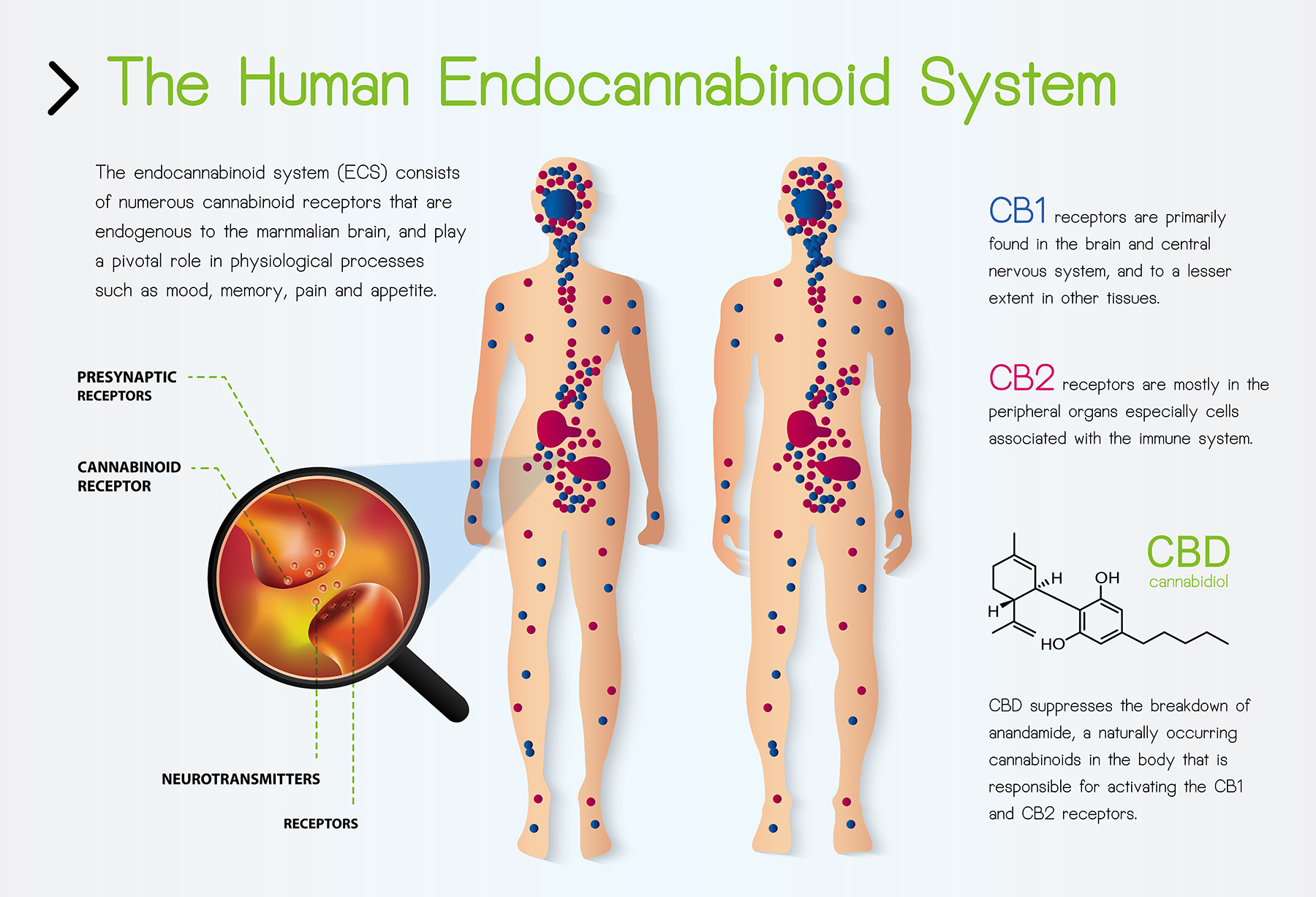The Science of Cannibanoids
The endocannabinoid system (ECS) is a complex biological system in the body that helps regulate various physiological processes, including mood, pain, appetite, and sleep. It plays a crucial role in maintaining homeostasis, the body's internal stability. The ECS is comprised of endocannabinoids, receptors, and enzymes that work together to modulate bodily functions.

Key Components of the ECS:
Endocannabinoids:
These are naturally produced chemical compounds that act as messengers within the ECS. The two main endocannabinoids are anandamide (AEA) and 2-arachidonoylglyerol (2-AG).
Receptors:
Endocannabinoids bind to specific receptors, primarily CB1 and CB2 receptors, located throughout the body. CB1 receptors are predominantly found in the central nervous system, while CB2 receptors are more prevalent in the peripheral and immune systems.
Enzymes:
Enzymes are responsible for synthesizing and breaking down endocannabinoids, regulating their activity and signaling within the ECS.
How the ECS Works:
1. Signal Creation:
When the body experiences a change or imbalance, endocannabinoids are synthesized and released.
2. Receptor Binding:
These endocannabinoids then bind to CB1 and CB2 receptors, depending on their location and the specific needs of the body.
3. Cellular Response:
Binding to these receptors triggers a cascade of cellular responses, ultimately influencing various physiological processes.
4. Regulation:
Enzymes break down the endocannabinoids, ensuring that the ECS doesn't over-respond and maintaining a balanced state.
Key Functions of the ECS:
Pain Modulation:
The ECS plays a role in regulating pain perception, potentially offering relief from both acute and chronic pain.
Mood Regulation:
It is involved in regulating mood and emotional responses, potentially influencing conditions like anxiety and depression.
Appetite and Digestion:
The ECS helps regulate appetite, food intake, and digestion, contributing to overall energy balance.
Sleep Regulation:
It may influence sleep patterns, promoting both sleep onset and sleep quality.
Inflammation and Immune Response:
The ECS is involved in regulating inflammation and immune responses, potentially playing a role in conditions like arthritis and other inflammatory diseases.
Inflammation and Immune Response:
The ECS also influences a wide range of other processes, including memory, learning, motor control, and reproductive function.
Interactions with Cannabis:
Phytocannabinoids:
The cannabis plant contains compounds called phytocannabinoids, such as THC and CBD, which can interact with the ECS by binding to the CB1 and CB2 receptors, according to NORML.
THC:
THC, the psychoactive component of cannabis, primarily binds to CB1 receptors, leading to its characteristic effects, including euphoria and altered perception.
CBD:
CBD, a non-psychoactive component, has a more complex interaction with the ECS, potentially modulating the effects of THC and influencing other receptors and enzymes.
Individual Variability:
The ECS can vary significantly between individuals, potentially explaining why people respond differently to cannabis.
In summary, the endocannabinoid system is a crucial regulatory system in the body, playing a vital role in maintaining overall health and well-being. It is involved in a wide range of functions, and understanding its mechanisms can provide insights into potential therapeutic applications for various conditions.
endocannabinoid system - Google Search
------------------------------------------------------------------------------------------------------
Cannabidiol (CBD), a non-psychoactive compound found in cannabis plants, has potential health benefits supported by scientific research.
Potential Benefits:
Anti-inflammatory and Pain Relief:
CBD may reduce inflammation and pain, potentially benefiting conditions like arthritis and chronic pain.
Anxiety and Stress Reduction:
CBD has been shown to have calming and anti-anxiety effects, potentially aiding in managing stress and anxiety disorders.
Neuroprotective Effects:
CBD may protect nerve cells from damage, potentially benefiting conditions like Alzheimer's and Parkinson's disease.
Heart Health:
CBD may improve heart health by reducing blood pressure and inflammation.
Improved Sleep:
CBD may promote better sleep quality by reducing anxiety and pain.
Skin Health:
CBD may have anti-inflammatory and antioxidant properties that benefit skin conditions like acne and eczema.
Digestive Health:
CBD may regulate gut health and alleviate symptoms of conditions like Crohn's disease and ulcerative colitis.
Anti-Cancer Effects:
Some studies suggest that CBD may have anti-cancer properties, although more research is needed.
Important Considerations:
The effectiveness and safety of CBD products can vary widely depending on factors like quality, dosage, and individual metabolism. More research is needed to fully understand the potential benefits and risks of CBD. Consult with a healthcare professional before using CBD, especially if you have underlying health conditions or are taking medications. CBD products may interact with certain medications or have side effects, such as drowsiness, dry mouth, and diarrhea. Choose reputable sources for CBD products and ensure they are tested for purity and potency.
benefits of cbd - Google Search
------------------------------------------------------------------------------------------------------

Potential Benefits of CBG:
Emotional Well-being:
CBG may help improve mood and promote a sense of calm and relaxation, without the psychoactive effects associated with THC.
Appetite Regulation:
Digestive Health:
Some research suggests CBG may help maintain normal bowel movements and support overall gut function.
Anti-inflammatory and Antioxidant Properties:
CBG is being studied for its potential to reduce inflammation and protect cells from damage.
Neuroprotective Properties:
Preliminary research indicates that CBG may have neuroprotective effects, potentially supporting brain health and function.
Pain Relief:
CBG is being explored for its potential to alleviate pain, particularly exercise-induced inflammation.
Antibacterial Properties:
Some studies suggest that CBG may have antibacterial properties, which could be beneficial in fighting off certain infections.
Skin Health:
CBG's potential effects on skin health are also being investigated, with some research suggesting it may help maintain healthy skin and support its natural balance.
Brain Support:
CBG may help with restoring mental function after brain damage and reducing the severity of neurological illnesses by reducing inflammation and preserving motor neurons.
-------------------------------------------------------------------------------------------------
Benefits of CBN (Cannabinol)
Cannabinol (CBN) is a minor cannabinoid found in cannabis plants, particularly in aged or oxidized cannabis. While research on CBN is still emerging, it shows potential for a range of therapeutic benefits, including:
Potential therapeutic benefits
Sleep Aid: CBN is most well-known for its potential sedative effects, making it a promising option for sleep disturbances like insomnia. Studies in rats have shown that CBN can increase total sleep time and decrease wakefulness.
Pain Relief: CBN may offer analgesic (pain-relieving) and anti-inflammatory properties. Studies suggest CBN could be beneficial for conditions like arthritis and chronic muscle pain.
Anti-inflammatory Effects: Like other cannabinoids, CBN exhibits anti-inflammatory properties.
Appetite Stimulation: CBN has been shown to potentially increase appetite.
Neuroprotective Qualities: Preliminary research suggests CBN may possess neuroprotective effects.
Antibacterial Properties: Early studies indicate CBN may have antibacterial properties.
Bone Health: Research suggests CBN may contribute to bone health.
Potential in Glaucoma Treatment: Studies indicate CBN may help reduce intraocular pressure.
Important considerations
Research is Limited: While promising, research on CBN is still in its early stages.
Potential Interactions: CBN may interact with certain medications. It is crucial to consult with a healthcare professional before incorporating CBN into your wellness routine.
Side Effects: Potential side effects of CBN include drowsiness, dry mouth, dizziness, and changes in appetite.
Legal Status and Product Quality: As CBN is derived from cannabis, its legality and the quality of products can vary. says the Sleep Foundation.
benefits of CBN - Google Search
----------------------------------------------------------------------------------------------------
Disclaimer: This information is for educational purposes only and should not be taken as medical advice. Always consult with a healthcare professional before making any decisions about your health or treatment.